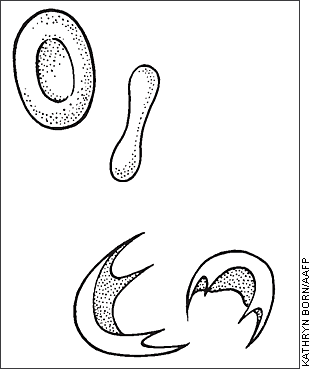
Am Fam Physician. 2006;74(2):313-316
See related article on sickle cell disease.
What is sickle cell disease?
Sickle cell disease is a type of blood disease that children inherit from their parents. It causes red blood cells (see picture) to make abnormal hemoglobin (say: HEE-mo-globe-in). Hemoglobin is the part of the blood that carries oxygen in the body. To tell if your child has sickle cell disease, your doctor will do some tests.

What problems can sickle cell disease cause?
If your child has sickle cell disease, he or she may be at risk of:
Pain episodes
Serious infection
Severe anemia
Stroke
What should I do if my child with sickle cell disease is in pain?
If your child has arm, leg, or back pain, call your doctor.
If your child has pain or rapid swelling in the stomach area, it may mean there is a problem with the liver or spleen. Take your child to the doctor as soon as possible.
How can I lower the chances of my child with sickle cell disease getting a serious infection?
Babies and children with sickle cell disease should get all of the usual childhood shots. Ask your doctor about the extra shots that also need to be given.
Some germs can cause severe health problems for your child. Your doctor may have your child start taking an antibiotic as early as two months of age. Your child will take this medicine until at least five years of age.
If your child ever has a fever over 101° F, take him or her to the doctor right away.
What is severe anemia and how is it treated?
If your child becomes very pale or tired, he or she may have severe anemia (uh-NEE-me-uh). Severe anemia is an emergency that must be treated with a blood transfusion.
Your child also may need a blood transfusion before having surgery. This will lower the chances of problems from the surgery.
What is a stroke and how is it treated?
A stroke is when the blood to the brain is suddenly stopped. This can cause brain cells to die. Strokes affect about one in every 10 children with sickle cell disease.
Your doctor can do a special test to see if your child is at risk of a stroke. If your child is two years or older, you should ask your doctor if the test is needed. If the test shows a higher risk of stroke, your doctor will talk with you about the use of regular blood transfusions.
If your child has weakness in an arm or leg, has slurred speech, refuses to walk, or has unusual behavior, it may be a sign of a stroke; take him or her to the doctor right away.
How can I keep my child with sickle cell disease healthy?
Your child should see a doctor who specializes in sickle cell disease. You will learn how to tell when your child is having a serious health problem. The doctor also will teach you about treatments. Even when babies seem healthy, their doctor should see them for examinations and blood tests every two to three months until two years of age. After that, their doctor should see them at least every six months. This will help the doctor know how your child’s body is working and if special treatments are needed.
Where can I learn more about sickle cell disease?
Your doctor.
Sickle Cell Disease Association of America
Telephone: 1-800-421-8453
Web site:http://www.sicklecelldisease.org
Emory University Sickle Cell Information Center
Telephone: 1-404-616-3572
Web site:http://www.scinfo.org/